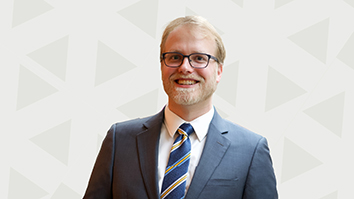
Quantum could transform how we communicate, compute, and develop in innumerable fields.
Jonathan Felbinger is deputy director of the Quantum Economic Development Consortium (QED-C), an association with approximately 250 corporate and government members that is managed by SRI. Felbinger spends his days promoting quantum — technologies based on a fundamental theory in physics that describes the behavior of matter and energy at the smallest scales, such as atoms.
He’s expanding his portfolio with his work on the 2025 International Year of Quantum Science and Technology, which will mark 100 years since the initial development of quantum. Here, he discusses his interest in technology, his trajectory toward quantum, and his excitement for the next big revolution.
I was born and raised in the Midwest. I spent my childhood playing in lecture rooms and graduate offices while my mother completed her doctorate. I like to think that exposure to a college environment might have instilled in me a sincere interest in advancing knowledge, even incrementally, in my own field.
My first area of interest was music. As a little kid, I played at the Old Town School of Folk Music and went to an Ella Jenkins concert. I was hooked! As I got older, I studied clarinet and played saxophone in the high school jazz band and went on to perform in classical ensembles through my post doc. I even considered a career in music. Along the way, I realized that engineering, math, and science resonated as a career.
An indelible impression
I recall a couple of experiences that influenced my interest in engineering. We got our first computer for statistical analysis and writing. I remember reading manuals — including BASIC programming — in their entirety. I watched as word processing displaced the typewriter and experienced the early Internet. At one point I went on a field trip to the Motorola campus and corporate museum; their goal to build a global communications network made an indelible impression. That was my first real exposure to microelectronics — and it became the area I specialized in at the start of my career.
“I entered quantum to pursue my interests in R&D and policy.” – Jonathan Felbinger
My interest in tech policy emerged during my doctoral studies at Cornell. I recognized that I was working on dual-use technology that had both civil and military applications. With a major in electrical engineering and a minor in science and technology studies, I focused my minor thesis on looking at the tensions between academic freedom and national security going back to the end of World War II and the Cold War. Several lessons from that period remain relevant, including those that attempt to control the proliferation of new technologies.
I entered the quantum sector to pursue my interests and work in research and development and policy for emerging technologies, specifically those that are dual use.
Identifying opportunities in quantum
Managed by SRI, QED-C is an international industry association that works with members to identify gaps and opportunities across quantum technologies and recommend approaches to address issues. QED-C works with a wide variety of commercial and research organizations and more than 40 agencies to advance quantum development and deployment. We bring together competitors, technology developers, suppliers, researchers, end users, and consultants, with the common goal of accelerating quantum toward practical application.One focus of QED-C is to explore quantum applications, including those that help address the UN Sustainable Development Goals, which is aligned with the International Year of Quantum!
A front row seat
The UN recently named 2025 the International Year of Quantum Science and Technology, and I have the fantastic opportunity of sitting on the steering committee. This yearlong effort will galvanize stakeholders around the world, increase exposure and awareness of quantum, and help build the workforce. It might even inspire applications that we haven’t imagined.
Industry’s ability to build and control systems at the atomic level is relatively recent, and we’re working to scale quantum to solve new types of problems. Quantum offers information and communications capabilities beyond what’s commercially available today.
I grew up during the Internet connectivity revolution, and now I’m excited to have a front row seat to help shape how quantum will impact the future.



